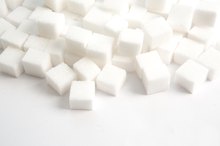The Nutritional Value of Citric Acid
You may have heard that citric acid is healthy for you and helps provide your cells with energy. Alternately, you may have heard that it's bad for you and that you can make it into fat. Both of these statements have some truth to them, though in reality, citric acid has little effect on your diet.
Citric Acid
Citric acid is a small, carbon-based compound that also includes the elements hydrogen and oxygen. It's common in nature -- most living organisms produce citric acid in the process of generating energy from nutrient compounds. Human cells are no exception; you make citric acid when you burn carbohydrate, protein and fat for energy, according to Drs. Reginald Garrett and Charles Grisham in their book "Biochemistry." You then break down this citric acid and generate the waste products carbon dioxide and water 1.
- Citric acid is a small, carbon-based compound that also includes the elements hydrogen and oxygen.
- Human cells are no exception; you make citric acid when you burn carbohydrate, protein and fat for energy, according to Drs.
Calories
Macromolecules in the Human Digestive System
Learn More
Citric acid technically contains 2.5 calories per gram, according to the Alcohol, Tobacco Tax and Trade Bureau in a printed article titled "Calories in Flavored Malt Beverages." This is lower caloric density than carbohydrates -- sugars and starch -- and protein, which contain four calories per gram 3. Fats also have higher caloric density, at nine calories per gram. The caloric content of citric acid, however, is a bit deceptive, since your cells don't take up anywhere near all of the citric acid you eat.
- Citric acid technically contains 2.5 calories per gram, according to the Alcohol, Tobacco Tax and Trade Bureau in a printed article titled "Calories in Flavored Malt Beverages."
Absorption
When you consume citric acid, you absorb most of what you consume into the bloodstream, according to a 1999 article in the scientific journal "Seminars in Nephrology." This is true of other nutrient compounds -- carbohydrates, proteins, and fats -- as well. The difference is that while your cells take up most of the carbohydrates, proteins and fats that you absorb, you urinate out most of the citric acid you absorb.
Cellular Uptake
Enzymes That Break Down Lipids
Learn More
The cells -- primarily the liver cells -- take up only a small amount of the citric acid from the bloodstream. Cells can then convert it into a small amount of fat. Because you can then burn fat for energy, it's true that citric acid contains energy, but only a little bit because of the small quantity that you actually take up into cells. Generally speaking, citric acid is a nearly negligible component of diet in terms of its nutritional value.
- The cells -- primarily the liver cells -- take up only a small amount of the citric acid from the bloodstream.
- Because you can then burn fat for energy, it's true that citric acid contains energy, but only a little bit because of the small quantity that you actually take up into cells.
Related Articles
References
- “Biochemistry”; Reginald Garrett, Ph.D., and Charles Grisham, Ph.D.; 2007
- "Seminars in Nephrology"; Citrate Transport by the Kidney and Intestine; A. Pajor; 1999
- "Calories in Flavored Malt Beverages"; Alcohol, Tobacco Tax and Trade Bureau; 2004
- Center for Science in the Public Interest. "Chemical Cuisine — Learn about Food Additives." https://cspinet.org/eating-healthy/chemical-cuisine.
- Codex Alimentarius, Food Additives Online Database. "Codex General Standard for Food Additives (GSFA) Online Database." http://www.fao.org/fao-who-codexalimentarius/standards/gsfa/en/.
- Max B, Salgado JM, Rodríguez N, Cortés S, Converti A, Domínguez JM. "Biotechnological Production of Citric Acid." Braz J Microbiol. 2010 Oct;41(4):862-75. http://www.ncbi.nlm.nih.gov/pmc/articles/PMC3769771/.
- United States Food and Drug Administration Database of Select Committee on GRAS Substances (SCOGS) Reviews"Citric acid." http://www.accessdata.fda.gov/scripts/fcn/fcnDetailNavigation.cfm?rpt=scogsListing&id=82.
- University of Wisconsin Hospitals Health Information: Health Facts for You. "Kidney Health: Citric Acid and Kidney Stones." http://www.uwhealth.org/healthfacts/nutrition/353.html.
Writer Bio
Kirstin Hendrickson is a writer, teacher, coach, athlete and author of the textbook "Chemistry In The World." She's been teaching and writing about health, wellness and nutrition for more than 10 years. She has a Bachelor of Science in zoology, a Bachelor of Science in psychology, a Master of Science in chemistry and a doctoral degree in bioorganic chemistry.









